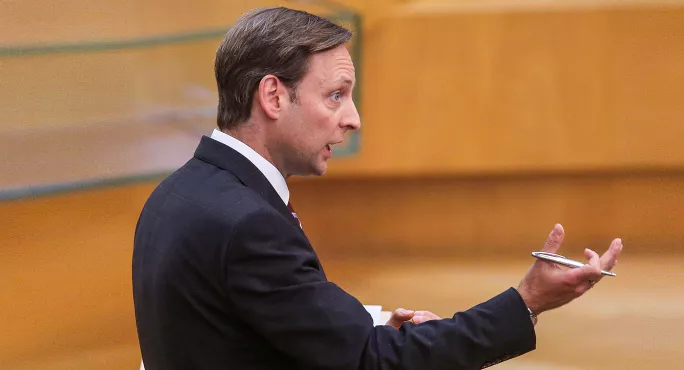‘Scottish education has huge strengths,’ says new shadow secretary

“Just attacking for the sake of attacking is not what I came into this to do,” explains Conservative MSP Liam Kerr, who became shadow education secretary at the end of June, replacing his namesake Stephen Kerr in the role just days before summer parliamentary recess.
It’s a statement that will be welcomed by many across Scottish education. While the job of opposition politicians is to challenge - and, of course, oppose - there is a sense that the unrelentingly negative mainstream media coverage this leads to has created the impression that nothing is going right in Scottish education.
“I think that’s a fair criticism,” Kerr admits, before promising that he will bring a new approach to the role.
“It’s irresponsible to be relentlessly negative... I don’t think that is my style and I think my friends throughout the Parliament in whatever party would accept that. We all have an interest, regardless of our party, in making the education system as good as it can be. And so I will readily acknowledge we have huge strengths,” he says.
Scottish education challenges
That’s not to say he will hold back where he believes critique is necessary, he stresses. But what Kerr intends to do is make clear how he would fix those challenges.
“I will always point out where I think the government could do better and I will always try to offer solutions. Again, I think that is my style, which perhaps not all opposition politicians will try to do. But I will always try and come up with a solution and work with the cabinet secretary to implement it,” he says.

“Ultimately, at some point both the cabinet secretary and I will be voted out - we will no longer be here. No one will remember if I am relentlessly critical but they will remember if the cabinet secretary and I actually sort some of this stuff out and make schools better for our teachers and pupils.”
- Background: Scottish Tories call for teacher pay differentiation in “core subjects”
- Related: Tories demand performance-related school funding
- Long read: What’s behind Scotland’s “behaviour emergency”?
- Analysis: Where next for Scottish education?
So where does Kerr - a North East Scotland MSP since 2016 - think the strengths of the Scottish education system lie, and what specifically needs sorting out?
Kerr - who was shadow cabinet secretary for net zero, energy and transport before the Conservatives’ reshuffle in June - praises the professionalism and passion of the pupil support assistants and teachers who work in Scottish schools. His wife works as an additional support needs teacher in an Aberdeen primary school “in one of the more challenging areas”, he says.
Such an answer is to be expected: ask any opposition politician about the strengths of the education system and they will almost always identify the staff in schools. It’s about politicians treading that fine line between criticising the government and the system but not the hardworking (and voting) staff who work in it.
Praise for teaching unions
Less predictably, Kerr - who describes himself as “a pretty centre-right Conservative MSP” - also praises the teaching unions.
“We have a really good teaching profession in our schools backed up from what I’ve seen by - and you might find this surprising from a Conservative - the trade unions, [who] seem to be very strong and vocal in standing up for their members. And I think that’s a good thing. That’s absolutely what we need,” he adds.
“My view is that, particularly with the challenges faced by the sector at the moment, it is vital that our education professionals have that voice standing up for them and ensuring the government is fully aware of the challenges.”
On those challenges, Kerr says the overriding problem is that the Scottish government lacks a clear strategy that sets out how it plans to deal with the difficulties the sector faces - including teacher recruitment, violence in schools and closing the disadvantage-related attainment gap.
The current approach, as he sees it, is akin to “playing Whac-A-Mole with different issues as they come up”.
“[The Scottish government] needs to develop a strategy. I think this is the core problem. There’s a lack of data but also there’s a lack of holistic thinking around, ‘OK, we have got these challenges - how do we actually address them?’ Because certainly, thus far, it seems that the response to that has been very piecemeal. It’s been, ‘OK, let’s fix this part,’ rather than thinking holistically.”
He will approve, then, of education secretary Jenny Gilruth’s recent decision to hit the pause button on the education reform set in motion by the 2021 review of Curriculum for Excellence to ensure “a clear trajectory” and that the change is “bold and holistic”?
Kerr isn’t prepared to let the government off the hook so easily. The SNP has been in power for 16 years and there has already been too much delay, he says.
Assessment reform
In terms of qualification and assessment reform, Kerr says he is against the proposal in Professor Louise Hayward’s review to do away with external exams in S4. He says he would be in favour of “a diverse assessment base” - but with exams as part of that.
“I think that will actually lead to a more holistic learning experience,” he says.
Inevitably, his views on education will have been influenced by his own experiences of school. Kerr, who worked as a lawyer before entering politics, was educated in the state sector - first at Trinity Primary School in Edinburgh and then Trinity Academy - for the majority of his schooling. He then attended private school George Watson’s College for the last two years of secondary and the end of S4.
He says he “loved” school and had “very good teachers almost across the board”. The move to George Watson’s College, he says, was made at his behest - his brother and sister, who are twins and two years younger, opted to remain at Trinity Academy.

Why did he want to go? Kerr says he “just fancied trying something different”. He also says he was an avid musician and he thinks that might have had something to do with it. The offer at Trinity was good but at George Watson’s it was better.
He remembers that “even then the difference in resourcing was pretty stark”. He says there were stricter rules at Watson’s, too. Boys were not allowed hair below collar-length and he had “fairly long hair” and “very long, very bushy sideburns”.
“I can remember getting sent home to sort it out, which I don’t recall ever being a risk at Trinity,” he says.
There is still some evidence of that rebellious streak today - on a shelf behind Kerr when we speak sits a motorbike helmet. He is keen to clarify that he is not going through a midlife crisis and he has been riding for 15 years now. This summer he started doing an advanced rider course.
“I love riding, but I also don’t want to die,” he says.
He prefers, however, to take the train when he travels south to the Scottish Parliament in Edinburgh.
And it will be when Parliament returns in September that it will become apparent just how constructive Kerr is prepared to be.
A more grown-up debate from politicians across the chamber - focused on solutions as opposed to mud-slinging - would certainly be welcomed by the teachers and headteachers on the frontline.
You need a Tes subscription to read this article
Subscribe now to read this article and get other subscriber-only content:
- Unlimited access to all Tes magazine content
- Exclusive subscriber-only stories
- Award-winning email newsletters
Already a subscriber? Log in
You need a subscription to read this article
Subscribe now to read this article and get other subscriber-only content, including:
- Unlimited access to all Tes magazine content
- Exclusive subscriber-only stories
- Award-winning email newsletters



